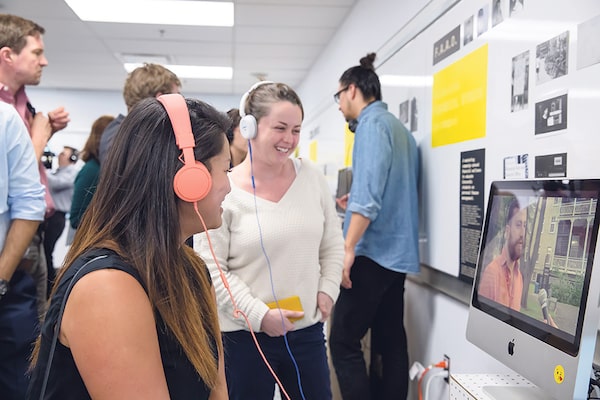
At Concordia’s idea lab District 3 (D3), students from multiple disciplines, such as engineering, fine arts, business and sciences, collaborate on projects.EMILY GAN
With its vibrancy and wide variety of people, languages, food and cultural events, Montreal leads North American cities (and is fourth in the world) in the QS best student cities ranking, where it is also number one in the “students’ view” category.
Students appreciate the city’s rich offerings and the experiences that come with them, says Matthew Stiegemeyer, director of student recruitment at Concordia University. “We consistently get positive feedback from both Canadian and international students about Montreal’s social settings, diversity, affordability and the enjoyment of their time outside class.”
Leveraging Montreal’s qualities to enrich students’ experiences starts with offering students a variety of environments, including the more traditional green university quad at the Loyola campus and the inner city bustle at the downtown campus, says Dr. Stiegemeyer. “For many students, their major will be based on one campus and electives or supporting classes on either campuses.”
Exposing students to different settings and creating spaces and opportunities for interdisciplinary collaborations can boost innovation, believes Dr. Stiegemeyer. Leveraging such creative synergy is Concordia’s idea lab District 3 (D3), where students from multiple disciplines, such as engineering, fine arts, business and sciences, collaborate on projects. “The idea of the incubator is to bring together the right talent at the right time, and leverage all the different perspectives for projects or ideas,” he says.
D3’s five-year track record is impressive: 386 startups have been coached and mentored, achieving $35-million in combined startup sales and financing and $91-million in combined startup valuation. The incubator space is also open to the public, Dr. Stiegemeyer adds. “We want to make sure we are good partners and create opportunities to collaborate with Montreal’s four universities and various colleges as well as the larger community.”
We need to anticipate what tomorrow – and the workforce to come – will look like.
— Dr. Matthew Stiegemeyer - Director of student recruitment at Concordia University
Collaborations and partnerships are important for boosting “outside the classroom” and experiential learning opportunities, including co-op and internship placements and study abroad and undergrad research opportunities, according to Dr. Stiegemeyer. “Students enjoy making connections in the workforce, putting their degree to work early on and graduating with an already established professional network. Most of them come back with strong reports about what they’ve learned.”
Gaining an understanding of work options in their chosen profession can help them further define – or even adjust – their career trajectory, says Dr. Stiegemeyer. “For example, the B.A. is a valuable degree, but the career path isn’t always linear or obvious. Participating in a co-op program or career counselling can help to define that path,” he explains. “We want to help students understand that being successful in their education and career is, in part, about finding the things they are truly passionate about.”
In today’s rapidly changing society, preparing students for their careers has to involve planning for the future, says Dr. Stiegemeyer. “Educating students according to today’s standards is not enough. We need to anticipate what tomorrow – and the workforce to come – will look like.”
By encouraging students to live, think and function in a variety of environments and collaborate across disciplines, Concordia aims to set them up for success, with Montreal providing fertile ground, he adds. “The city offers a context for letting students connect their studies to real life outside the classroom.”
Boosting skills with international experience

82%
of employers who hire recruits with international and intercultural experiences say these employees enhance their company’s competitiveness, according to a 2014 Universities Canada survey.
Although 78%
of universities provide some funding to support study abroad initiatives, 91 per cent say that lack of funds is one of the top three reasons for low student mobility rates.
One in 10
young Canadians crosses a provincial border to complete a university degree.
97%
of universities offer their students international experiences such as academic coursework, field schools, work terms and community service learning.
Just 3.1%
of full-time undergraduates (about 25,000) had a short-term international experience in 2012-13. Only 2.6 per cent had a for-credit experience abroad.
Produced by Randall Anthony Communications. The Globe’s editorial department was not involved in its creation.